Join the UK Bebras Challenge 2025
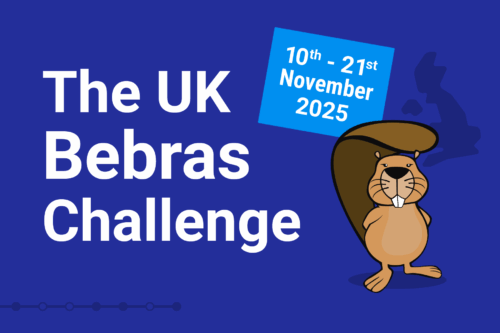
The UK Bebras Challenge, the nation’s largest computing competition, is back! Schools can enter now for this year’s Challenge, which runs from 10 to 21 November.
Last year, more than 467,000 students from across the UK took part, tackling fun and thought-provoking puzzles that introduce key ideas in computational thinking with no extra preparation needed.
Read on to learn how your school can get involved.
What is the UK Bebras Challenge?
The UK Bebras Challenge is a free-to-enter annual challenge that is designed to spark interest in both computational thinking and computer science among students aged 6 to 19. The 45-minute challenge is accessible to everyone, offering age-appropriate but challenging interactive tasks for students at different levels, including a tailored version for students with severe sight impairments.
The tasks are designed to give every student the opportunity to showcase their potential and all participating students receive a certificate. There are also certificates based on performance within school and gold certificates based on national boundaries. With self-marking tasks and no text-based programming required, it’s easy to have your school participate in the UK Bebras Challenge.
This year, each task’s background section is linked to the Ada Computer Science platform. Teachers and students can now explore detailed explanations of the computing concepts behind the Bebras tasks, along with the computational thinking skills students may use to solve them.
“Bebras provides us with incredibly useful insights and conversations about our students who might otherwise have struggled with accessing traditional CS materials. It’s also a great resource for baseline tests where students may not have studied the curriculum the way we present it.” – Teacher in the UK
“I think the problems are a really great way to promote critical thinking, computational thinking, and logic in general. I have only seen a couple but I am very impressed and excited to share with some of my students. Thanks for what you are doing.” – Teacher in the UK
What does a UK Bebras task look like?
The tasks are inspired by classic computing problems and presented in a fun, age-appropriate way. For example, younger students aged 6 to 8 might solve the mystery of a dancing doll, while older students aged 16 to 19 could take on the challenge of an art theft. Both of these tasks involve the use of data structures.
Here’s a question we ran in 2021 for the Juniors group (ages 10 to 12). Can you solve it?
Beaver farmer
Farmer Mert grows wheat in the fields, which contain a symbol in the map below.
He also has stony fields where nothing grows, shown by the symbol.
To save water, Mert only wants to water the wheat fields. He can block the water channels coming from the lake at the spots marked with the letters A to J.
The water will only flow downwards towards the fields and will never flow back towards the lake.
Task
Select the letters to block the water from flowing to the empty fields while still letting it flow to the wheat fields.
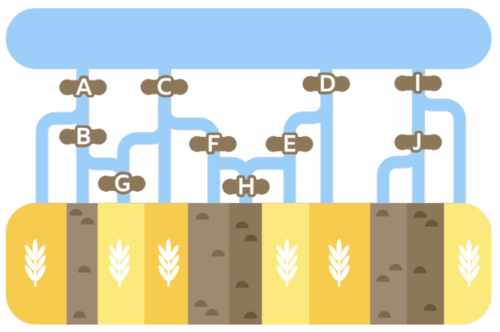
Example answer
The correct answer is that spots labelled B, F, H, and J must be closed, as shown in the following figure:
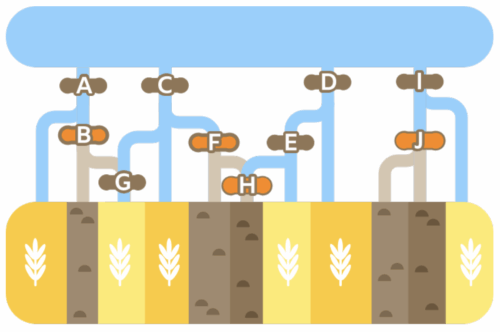
Explanation
If none of the gates are closed, the water will reach the stony fields. If more gates than shown above are closed, then some wheat fields will get no water. If we review all spots:
- A must be open to allow water to flow to field 1.
- B has to be closed to avoid watering field 2. It also brings water to field 3, but this field can also get it through C.
- C must be open both for field 4 and for field 3, which cannot be watered though A since B is closed.
- D must be open for fields 7 and 8.
- E must also be open field 7.
- F must be closed to prevent water flowing to field 5.
- G, if closed, would only prevent field 3 from being watered and so must be open as well.
- H must also be closed even if F is also closed, as water can flow from the open D and E.
- I must be open for field 11.
- J has to be closed to prevent fields 9 and 10 from getting watered.
This Bebras task was developed by the Bebras team in Turkey and refined by members of the international Bebras community.
Did you get it right?
How do I get my school involved?
If you are either a UK school or teach a UK-based curriculum, then visit the UK Bebras website for more information and to register your school.
Once you’ve registered, you’ll get access to the entire UK Bebras back catalogue of questions, allowing you to create custom quizzes for your students to tackle at any time throughout the year. These quizzes are self-marking, and you can download your students’ results to keep track of their progress. The questions are perfect for enrichment activities, end-of-term quizzes, lesson starters, and even full lessons to develop computational thinking skills and promote computing concepts.
Join for free at bebras.uk/admin.

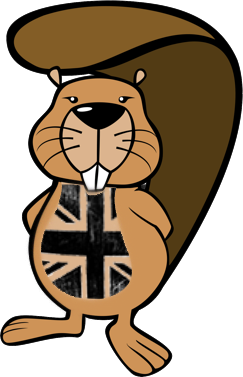
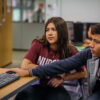

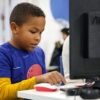


1 comment
Jump to the comment form
Vedansh Rudra
Wow!